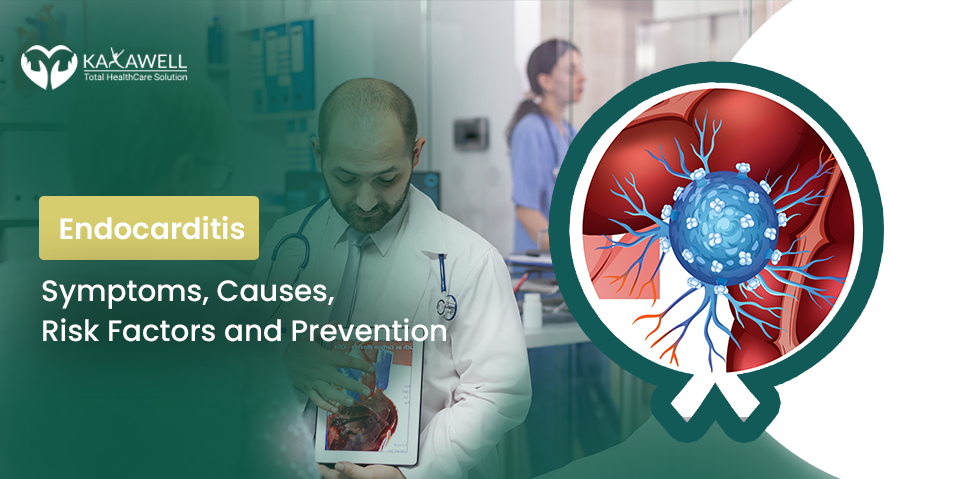What is Endocarditis?
The endocardium is the heart’s inner lining. Endocarditis is an inflammation of the inner lining. Endocarditis typically occurs when bacteria, fungi, or other germs from the atmosphere or other areas of the body, such as your mouth, spread into your bloodstream and bind to heart valves. Endocarditis may weaken or kill your heart valves and contribute to life-threatening complications if not treated quickly.
What are the symptoms of endocarditis?
Endocarditis symptoms can be difficult to detect and vague and can develop gradually over weeks or months. However, in some cases, they can develop abruptly.
The most common Endocarditis signs are:
- Symptoms similar to flu – these include temperature, fatigue, headaches, chills, cough, and sore throat.
- Unreported weight loss
- Pale skin
- Muscles and joints sore
- Heart murmurings (an abnormal sound of the heart).
When you have been advised you are at high risk of developing endocarditis and you have more than a week of flu-like symptoms and a high temperature, see your doctor right away.
When to seek medical attention
Call your provider if you notice the following symptoms during or after treatment:
- Blood in urine
- Chest pain
- Fatigue
- Fever that doesn’t go away
- Fever
- Numbness
- Weakness
- Weight loss without a change in diet
Causes of Endocarditis
Most endocarditis is caused by bacteria that enter the bloodstream, but some cases may be caused by fungi or other micro-organisms. The germs pass across the bloodstream and bind to defective heart valves or other damaged heart tissue, leading to inflammation afterwards.
In most cases, the immune system kills any infection entering the bloodstream before it can travel to the heart. Nevertheless, it can also enter the heart of certain cases, and cause endocarditis.
There are a variety of ways Germs can penetrate the bloodstream including:
- Eating or drinking.
- Brushing your teeth or other oral activities that could cause your gums to bleed.
- An infection or other medical condition, including sores on the skin, gum disease, sexually transmitted infections, and others.
- Catheters, a thin tube used in certain medical procedures. This is more common if the catheter is in place for a long period.
- Tattoos and piercings.
- Intravenous illegal drug use with a contaminated needle.
- Certain dental procedures that involve cutting your gums.
Risk factors
An individual may have a greater risk of developing endocarditis if:
- have a known heart disorder or disease
- have had heart bypass surgery or received an artificial heart valve
- You developed a heart valve disease such as rheumatic fever.
- Was issued a pacemaker
- Have obtained medications intravenously routinely
- Is convalescent after a severe bacterial illness, such as meningitis or pneumonia
- Having a chronically suppressed immune system, for example, due to diabetes or Aids, or whether they have cancer or are undergoing chemotherapy
Our heart valves degenerate as people age increase, raising the risk of endocarditis
Complications of Endocarditis
Endocarditis may cause blood cell clumps and bacteria to develop within your heart’s blood vessels.
These clumps, called vegetations, can break off and make of clots of blood. These can migrate to other areas of the body where new infections can develop, or block blood flow.
If you have endocarditis symptoms it is important to get in contact with your doctor right away.
The sooner you can undergo antibiotic therapy, the less likely you are to experience severe complications.
Complications include endocarditis:
- Meningitis or other brain infections
- Strokes or seizures
- Pulmonary embolism (sudden blockage of blood flow to the lungs)
- Pneumonia
- Damage to kidneys or spleen
- Cardiac issues (heart murmur, heart failure, heart valve injury, heart attack, irregular heartbeat)
Prevention
You can help in many ways to avoid endocarditis including:
- Learn signs of endocarditis and its symptoms; When you experience any signs or symptoms, particularly a fever that won’t go away, unexplained weakness, some sort of skin infection, or open cuts or sores that don’t heal properly see your doctor immediately.
- Pay special attention to your dental health — brush and floss your teeth and gums regularly, and do daily dental tests.
- Avoid skin infection procedures, such as body piercings or tattoos.

Leave a Reply
You must be logged in to post a comment.